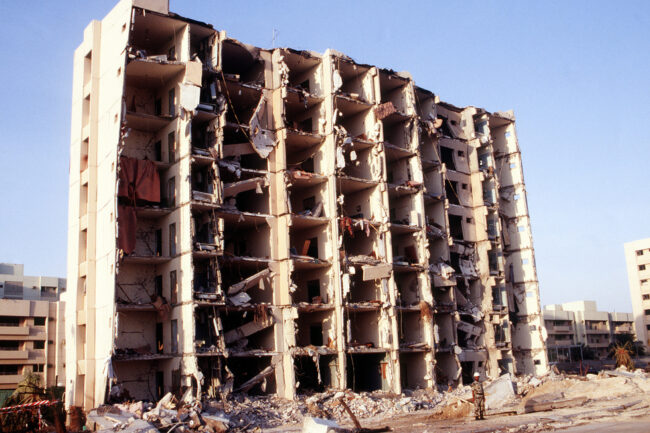 The Fairness for 9/11 Families Act, a piece of legislation that aimed to provide financial compensation to victims of terrorism, has been a contentious issue since its inception. While the Fairness Act has been widely praised for its intent to support those who suffered from acts of terror, a significant group of Khobar Towers bombing survivors were inadvertently excluded from the Fairness Act’s compensation plan. This article explores the challenges faced by Khobar Towers survivors who are striving to be included in the Fairness Act’s payment provision.
The Fairness for 9/11 Families Act, a piece of legislation that aimed to provide financial compensation to victims of terrorism, has been a contentious issue since its inception. While the Fairness Act has been widely praised for its intent to support those who suffered from acts of terror, a significant group of Khobar Towers bombing survivors were inadvertently excluded from the Fairness Act’s compensation plan. This article explores the challenges faced by Khobar Towers survivors who are striving to be included in the Fairness Act’s payment provision.
Origins of The Fairness for 9/11 Families Act
In the aftermath of the September 11, 2001, terrorist attacks on American soil, the U.S. government recognized the need to provide financial support to victims and their families. A 9/11 Victims Compensation Fund was created but the funding was only sufficient to compensate the initial group of claimants. When the 9/11 Fund was depleted, subsequent claims went uncompensated. Later, 9/11 victims were admitted to the U.S. Victims of State Sponsored Terrorism Fund (USVSST Fund) but their claims went unpaid due to lack of resources.
The Fairness for 9/11 Families Act emerged as a bipartisan effort to ensure that the subsequent group of claimants affected by the horrific events of 9/11 could finally be compensated. The Fairness Act provided funding for the second group of 9/11 victims and their families to receive one-time catch-up payments so that they would be on par with the first group of 9/11 claimants.
The Fairness for 9/11 Families Act also encompassed other acts of terrorism. One such incident was the Khobar Towers bombing in 1996, a devastating attack on a U.S. military barracks in Saudi Arabia that resulted in the loss of 19 American lives and injuries to hundreds more. As discussed below, due to inadvertent error, the Fairness Act excluded most of the Khobar Towers survivors from receiving catch-up payments.
The Khobar Towers Survivor Dilemma
Despite expressly intending to provide Khobar Towers attack survivors with catch-up payments, the Fairness Act excluded most Khobar Towers claimants from catch-up payment eligibility. As a result, the vast majority of Khobar Towers bombing survivors not only have to struggle to cope with their physical and emotional injuries, but they now must deal with financial burdens imposed upon them due to their exclusion from the Fairness Act.
Eligibility Criteria Exclude Those In Need
The Fairness Act was enacted on December 29, 2022 to provide funding to Khobar Towers survivors and others, who had missed prior payments from the USVSST Fund. The Fairness Act provided funding and mandated one-time catch-up payments to eligible claimants.
Certain Khobar Towers survivors were excluded from receiving catch-up payments due to the Fairness Act’s strict eligibility rules. Khobar Towers survivors who obtained judgments prior to that date were deemed eligible for catch-up payments provided their claims were made to the USVSST Fund after the enactment date. Although most Khobar Towers survivors had obtained judgments prior to the enactment date, they were excluded because they filed claims prior to and not after the date the Fairness Act was enacted.
The flaw in the Fairness Act is that it assumed pre-existing claimants had been fully compensated and did not require catch-up payments. That was incorrect. In fact, Khobar Towers survivors with longstanding claims, never received full compensation from the USVSST Fund. Thus, the Fairness Act’s rules excluded these Khobar Towers survivors even though they deserved catch-up payments.
Political and Diplomatic Complications
Another major hurdle faced by Khobar Towers survivors in their quest for compensation is the sensitive political and diplomatic relationship between the United States and Saudi Arabia. The Khobar Towers attack was attributed to Iran-backed terrorists operating within Saudi Arabia, which posed a delicate situation for the U.S. government. Maintaining strong relations with Saudi Arabia has been a priority, often at the expense of the victims’ pursuit of justice.
As a result, the U.S. government has been reluctant to take decisive action against Saudi Arabia, hindering the ability of Khobar Towers survivors to hold those responsible accountable. This has left survivors feeling abandoned and betrayed, as their government’s interests appear to take precedence over their well-being.
The Urgent Need for Equitable Compensation
The Fairness for 9/11 Families Act was intended to provide support and justice to victims of terrorism, including Khobar Towers survivors. However, the reality is that a significant portion of long-suffering Khobar Towers survivors remain sidelined in their quest for compensation, merely because they were pre-existing claimants to the USVSST Fund. Addressing this issue is not only a matter of fairness but also a moral obligation to those who have endured unimaginable suffering.
A Call for Legislative Reform
The only solution to the inequity faced by the excluded Khobar Towers survivors is to amend the Fairness for 9/11 Families Act. By revising the eligibility criteria and broadening the scope of the Fairness Act, the government can ensure that these excluded Khobar Towers survivors are not left behind. This issue requires bipartisan support and a commitment to passing legislation to rectify the existing injustice.
Public Awareness and Advocacy
Raising public awareness about the plight of Khobar Towers survivors is crucial to building support for their cause. Survivor organizations, advocacy groups, and concerned citizens must work together to shed light on the injustice faced by these individuals. This can be achieved through media campaigns, grassroots activism, and engagement with lawmakers.
The Fairness for 9/11 Families Act was a commendable effort to provide compensation and justice to victims of terrorism. However, its implementation has fallen short for a significant group of survivors, particularly those affected by the Khobar Towers bombing. The exclusion of approximately 95% of Khobar Towers survivors from compensation payments highlights the urgent need for reform and equity in this process.
To ensure that the Fairness Act lives up to its name, lawmakers and advocates must work collaboratively to enact an amendment to the original law to include those Khobar Towers survivors who were previously left out.
It is imperative that we stand by these victims of terrorism, and ensure that they receive the support and justice they deserve.
